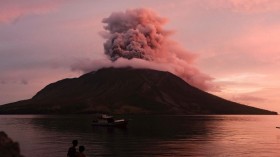Dredging near coral reefs can lead to increase risk of diseases in corals, new study finds.
Researchers at ARC Centre of Excellence for Coral Reef Studies and colleagues say that a high level of sediments at the reef stresses the corals, which increases disease risk.
Dredging is the removal of sediments from the bottom of lakes, rivers, harbors or other waterways.
The study contradicts the claims made by Australia's Environment Minister Andrew Powell, who recently said that dredging doesn't damage corals. According to Powell, changes in weather pattern, bleaching and starfish population affect corals more than ports or shipping, news.com.au reported
"At dredging sites, we found more than twice as much coral disease than at our control sites," said the lead author of the study, Joe Pollock, a PhD candidate from the ARC Centre of Excellence for Coral Reef Studies (Coral CoE).
"Corals require both light and food to survive," Pollock explained in a news release. "And unfortunately, dredging impacts corals on two fronts: increased turbidity means less light for photosynthesis, while increased levels of sediment falling onto the coral can interfere with their ability to feed."
Corals have to spend extra energy to clear the silt and from the surface of their bodies. Extra work coupled with less food leads to an energy imbalance and chronic stress. And, just like any other organism, long-term stress leads to increased disease risk in corals.
The study was conducted from Barrow Island, off the West Australian coast. The study site is close to an earlier dredging project that removed 7-million cubic metre over 18-month period. The sediments were removed to create a channel to accommodate ships that transported liquefied gas to a nearby processing plant.
'White syndromes,' was the most common disease that affected the corals at the study site, researchers found. The disease leads to tissue loss. These diseases are chronic and researchers fear that the condition could affect corals years after the completing of dredging.
Coastal industries provide economic opportunities, food security and even reliable sources of energy to millions of people. "Dredging is a pressing issue on many coral reefs throughout the world, including the Great Barrier Reef," Pollock said in a news release.
The study is published in the journal PLOS One.
© 2024 NatureWorldNews.com All rights reserved. Do not reproduce without permission.

![Extreme Heat Wave in Africa’s Sahel Region That Killed 100 People Linked to Climate Change [Study]](https://1471793142.rsc.cdn77.org/data/thumbs/full/70226/280/157/50/40/extreme-heat-wave-in-africa-s-sahel-region-that-killed-100-people-linked-to-climate-change-study.jpg)



